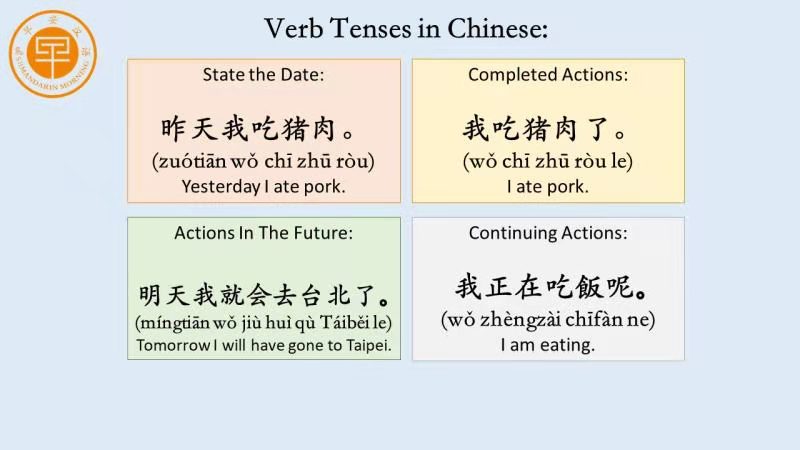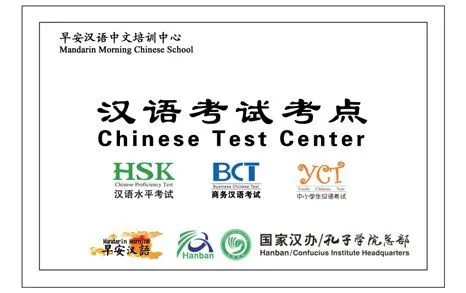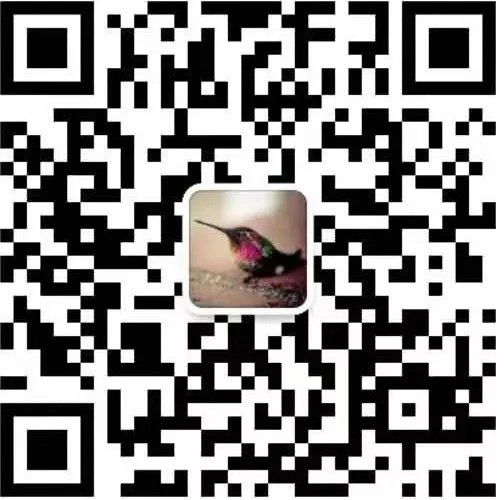| Western languages such as English have several ways to express tense. The most common are verb conjunctions which change the form of the verb depending on the time frame. For example, the English verb "eat" can be changed to "ate" for past actions and "eating" for current actions. Mandarin Chinese does not have any verb conjugations. All verbs have a single form. For example, the verb for "eat" is 吃 (chī), which can be used for the past, present, and future. Despite the lack of Mandarin verb conjugations, there are other ways to express timeframes in Mandarin Chinese.  State the Date The simplest way to clarify which tense you are speaking in is to directly state the time expression (like today, tomorrow, yesterday) as part of the sentence. In Chinese, this is usually at the beginning of the sentence. For example: 昨天我吃猪肉。(zuótiān wǒ chī zhū ròu) = Yesterday I ate pork. Once the timeframe is established, it is understood and can be omitted from the rest of the conversation. Completed Actions The particle 了 (le) is used to indicate that an action occurred in the past and has been completed. Like the time expression, it can be omitted once the timeframe has been established: (昨天)我吃猪肉了。(Zuótiān) wǒ chī zhū ròu le) = (Yesterday) I ate pork. The particle 了 (le) can also be used for the immediate future, so be careful of its usage and be sure to understand both functions. Past Experience When you have done something in the past, this action can be described with the verb-suffix 过 (guò). For example, if you want to say that you have already seen the movie you can say: 我已经看过。 (wǒ yǐjīng kàn guò) Unlike the particle 了 (le), the verb suffix guò 过 is used to talk about an unspecific past. If you want to say that you saw the movie yesterday, you would say: 昨天我看了。 (zuótiān wǒ kàn le) Completed Actions In The Future As mentioned above, the particle 了 (le) can be used for the future as well as the past. When used with a time expression such as 明天 (míngtīan - tomorrow), the meaning is similar to the English perfective. Take for instance: 明天我就会去台北了。 (míngtiān wǒ jiù huì qù Táiběi le) = Tomorrow I will have gone to Taipei. The near future is expressed with the combination of the particles 要 (yào - to intend); 就 (jiù - right away); or 快 (kuài - soon) with the particle 了 (le): 我要去台北了。 (wǒ yào qù Táiběi le) = I'm just going to Taipei. Continuing Actions When an action is continuing to the present moment, the expressions 正在 (zhèngzài), 正 (zhèng) or 在 (zài) can be used, along with the particle 呢 (ne) at the end of the sentence. This can look something like: 我正在吃飯呢。 (wǒ zhèngzài chīfàn ne) = I am eating. The continuative action phrase is negated with 没 (méi), and 正在 (zhèngzài) is omitted. The 呢 (ne), however, remains. For example: 我没吃飯呢。 (wǒ méi chīfàn ne) = I am not eating. # About us # Founded in 2007 Chinese test and training center 200+ Chinese teachers 5000+ students  # Contact us# Name:fiona Phone number:021-52287809,13918358891 E-mail:info@mandarinmorning.com www.mandarinmorning.com If you are interested to join Mandarin Morning school or want more details about our services, scan the following QR code. ☟   Mandarin Morning Chinese test center attached to Confucius institute headquarters Authorized Test Center and Training Center for International Chinese Language Teacher Certificater 10 years+ ,200 teachers ,more 10000 students,200+companies  |